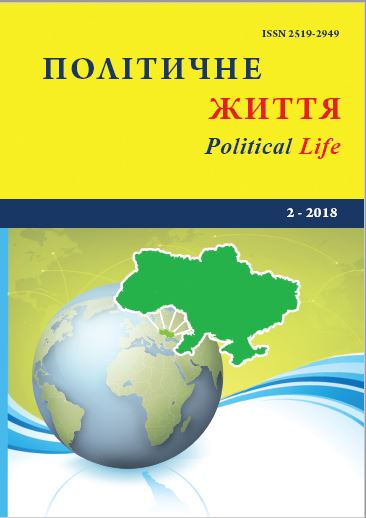Рolitical networks as new principles of relations in modern societies.
DOI:
https://doi.org/10.31558/2519-2949.2018.2.10Keywords:
network, social network, public-political network, interaction, trust, horizontal and relations, societyAbstract
Any networks are a type of interaction structure of social actors (both collective and individual), which is formed on the basis of horizontal links between them. Modern public policy is a product of complex interaction between people. During the last decade, the number of participants in the policy process has sharply increased. The network principle is based on the idea that public policy is shaped in the context of relationships and interdependence. Of course, the dissemination of the network form of interaction contributes to the evolution of information technology. The network approach combines the theory of political networks and the actual network analysis. It is aimed at clarifying the attributes of actors, the characteristics of communications, as well as the strength of communication, the size of the network. The method of network analysis is often called «new optics» to address a variety of social problems. The network is a set of diverse socio-political actors who have some common (corporate) interest in a specific area of public and public life. Participants in public-political networks engage in volunteering. Network analysis provides an opportunity to explore communications in the public-political sphere. The public-political network, in our opinion, is a model of representation and realization of interests of subjects of public and political life. In the context of our research issues, the public-political network (in crowdsourcing and crowdfunding relations) can be defined as a set of non-hierarchical relations between actors in the socio-political process, which combine common interests and the exchange of resources to promote these interests. Creation of crowdfunding and crowdsourcing networks takes place provided the participants are united with the goals, general outlook, proximity to understanding the problem-solving solution based on horizontal relations.References
Богуславська К. О. Мережевий підхід у дослідженні зв’язків політичних акторів / Катерина Олександрівна Богуславська : автореф. дис. ... канд. наук : 23.00.01. ‒ 2008. – 19 с.
Вінникова Н. А. Вплив політичних мереж на прийняття політико-управлінських рішень / Н. А. Вінникова // Стратегічні пріоритети. ‒ 2013. ‒ № 1 (26). ‒ С. 38‒42.
Peterson J. Decision-making in the European Union: towards a framework for analysis / J. Peterson // Journal of European Public Policy. – 1995. – № 2 (1). – P. 69–93.
Wright M. Policy community, policy network and comparative industrial policies / M. Wright // Political Studies. – 1988. – № 36 (2). – P. 593–612.
Кірієнко О. Антиглобалізм як новий соціальний рух : структура, цінності, форми та методи діяльності / О. Кірієнко // Вісн. Львів. нац. ун-ту. – Сер.: Філософско-політол. студії. – 2013. ‒ Вип. 3. ‒ С. 313‒321.
Сергєєв В. С. Політичні мережі як форма взаємодії держави та громадянського суспільства (теоретико-методологічний аналіз) / В’ячеслав Сергійович Сергєєв: автореф. дис. ... докт. політ. наук : 23.00.01. ‒ 2011. – 32 с.
Марченко О. Інтелектуальний краудсорсинг як категорія інформаційного суспільства / О. Марченко // Strategiczne pytania światowej nauki-2013 : Materiały IX Międzynarodowej naukowi-praktycznej konferencji. – Przemyśl : Nauka i studia, 2013. – Vol. 8 : Ekonomiczne nauki. – S. 51–53.
Косуля І. Ю. Краудсорсинг та краудфандинг: нові поняття чи нові феномени / І. Ю. Косуля // Методологія, теорія та практика соціологічного аналізу сучасного суспільства. ‒ 2014. ‒ Вип. 20. ‒ С. 67‒271.
Джайлс М. Настоящие друзья / М. Джайлс // Мир в 2050 году; под. ред. Д. Франклина и Дж. Эндрюса. – М.: Манн, Иванов и Фербер, Эксмо, 2013. – 368 с.
Сергєєв В. С. Вказ. автореферат.
Олсон М. Логика коллективных действий: Общественные блага и теория групп; пер. с англ. Е. Короленко. ‒ М.: Фонд экономической инициативы, 1995. ‒ Т. 1. ‒ 165 с. (Сер. «Экономика»).
Олсон М. Логіка колективної дії. Суспільні блага і теорія груп / М. Олсон. – К.: Лібра, 2004. – 271 с.
Олсон М. Вказ. робота, 2004.
Химич І. Краудсорсинг – сучасна фінансово-маркетингова стратегія підприємства / І. Химич // Соціально-економічні проблеми і держава. ‒ 2014. ‒ Вип. 1 (10). ‒ С. 242‒249. [Електронний ресурс]. ‒ Режим доступу: http://sepd.tntu.edu.ua/images/stories/pdf/2014/14 kihmsp.pdf. – Назва з екрана. – Дата доступу: 03.04.2016.
Хау Дж. Краудсорсинг. Коллективный разум как инструмент развития бизнеса / Дж. Хау; пер. с англ. – М.: Альпина Паблишер, 2012. – 288 с.
Хау Дж. Вказ. робота.
Швальц В. Краудсорсинг и выборы в парламент Голландии [Електронний ресурс]. – Режим доступу : http://crowdsourcing.ru/article/political-salon-crowdsourcing-elections-in-the-netherlands. – Назва з екрана. – Дата доступу : 24.11.2014.
Кривошеїн В. Постсистемні підходи до аналізу політики // Історія політичної думки: підручник / за заг. ред. Н. М. Хоми [І. В. Алєксєєнко, Т. В. Андрущенко, О. В. Бабкіна та ін.]. – Л.: «Новий Світ–2000», 2016. – 1000 с. ‒ С. 614‒631.
Кастельс М. Становление общества сетевых структур / М. Кастельс // Новая постиндустриальная волна на Западе: антология / под ред. В. Л. Иноземцева. – М.: Academia,1999. – С. 492‒505.
Кастельс М. Вказ. стаття.
Кастельс М. Информационная эпоха: экономика, общество и культура / М. Кастельс. – М.: ГУ ВШЭ, 2000. – 608 с.
Кастельс. Вказ. робота, 2000.
Дащаківська О. Політична еліта в теоріях інформаційного суспільства: особливості діяльності та структури / О. Дащаківська // Вісн. Львів. нац. ун-ту. – Сер. : «Філос.-політол. студії». ‒ 2011. ‒ № 1. – С. 311‒321.
Rhodes R., Marsh D. Policy Network in British Politics. A Critique of Existing Approaches // Policy Network in British Government / Eds. D. Marsh and R. Rhodes. ‒ Oxford: Clarendon Press, 1992. ‒ P. 1–26.
Borzel T. Organizing Babylon ‒ on the Different Conceptions of Policy Networks / Т. Borzel // Public Administration. ‒ 1998. ‒ Vol. 76. ‒ № 2. – Р. 253‒273.

